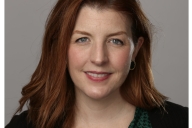You have /5 articles left.
Sign up for a free account or log in.
SALT LAKE CITY -- When articles came out about Yale University renaming one of its residential colleges that had been named after John C. Calhoun, the champion of slavery in the Senate, Sandra Sohne-Johnston showed all of her students who were considering attending the Ivy League university.
Almost none had been paying attention to the name debate, said Sohne-Johnston, director of college counseling at St. Anne's-Belfield School in Charlottesville, Va. But she thought it was important for them to consider what it means to attend a university like Yale, which has a history of oppression and has reinforced white privilege, she said. What opportunities will students have there for access and entry? If they are white or nonwhite, where can they begin to make change?
“On their own, sometimes, our students don't think about these,” said Sohne-Johnston, who has previously been director of admissions recruitment and programming at Colby College. “But these are things that I think we have a responsibility to talk to them about.”
Sohne-Johnston's example was one point in a larger discussion during a session Thursday at the National Association for College Admission Counseling's national conference. Panelists during the session, titled “Racism in College Counseling and Recruitment: Practices That Reinforce White Privilege and Systemic Racial Prejudice,” stated one of their goals was to have an honest, candid and potentially uncomfortable conversation.
The session comes as tensions over race, identity and culture continue to play out on college campuses across the country. To give a few examples just from Yale, the university decided to remove Calhoun's name from a residential college in 2017. But it was also in the news this May when a white student called campus police on a black graduate student who was napping in a dormitory common room.
Plus, Yale is factoring into the renewed debate over affirmative action. The U.S. Departments of Justice and Education on Wednesday said they were investigating whether the university discriminates against Asian American applicants, an investigation that echoes a lawsuit against Harvard University.
Discussion of racism has taken center stage at NACAC's national conference in the past. Last year, keynote speaker Shaun R. Harper told attendees their profession is 80 percent white and urged them to do more to advocate for racial justice.
Anyone who attended Harper's speech and Thursday's session would have heard similar themes. Panelists on Thursday repeatedly talked about the need for those in positions of power to push for change, even if they do not hold the top jobs in their offices.
They called on college counselors and admissions officers from all backgrounds to drive changes. But they specifically said their white colleagues need to act.
That's because racism in the United States has put white people in a position of power, said Ari Worthman, director of college counseling at Lakeside School in Seattle, who previously worked as assistant director of admissions at Haverford College.
“There can be tons and tons -- and there are -- of nonwhite people that are doing great work, educational work and many times leading the fight,” he said. “But in the end, it's only those of us who are white that can either vote or volunteer to give up our privileges and change the system that has been designed to benefit us for all of these years.”
Racism is by definition systematic, Worthman said. He cited Robin DiAngelo's book What Does It Mean to Be White (Peter Lang International Academic Publishers) to define racism in the U.S. as white racial and cultural prejudice and discrimination that is supported intentionally or unintentionally by institutional power and authority. It advantages whites and disadvantages people of color, he said.
Requiring students to take standardized tests in order to be admitted to a college is a racist policy, Worthman said, because white and Asian students, on average, earn higher scores than black and Latino students. By extension, well-read rankings of colleges that value students' test scores are also promoting racism.
“You end up with a dominant culture,” Worthman said. “That group, essentially, poses its culture as the right way, the only way, the universal way. So in our society, we have a dominant white culture.”
Worthman, who identified himself as white, challenged attendees to think about what systems their campuses have in place that might benefit white students over nonwhite students. He also challenged them to think about the choices their colleagues make.
Those choices could be everything from who recruits students to a particular college, which colleges counselors tell high school students are unsafe, and the support mechanisms that are in place for students of color once they arrive on a campus, according to the session's speakers. College admissions officers should ask themselves what is the purpose of recruitment and what services they will provide once a student is on campus, said Danielle Yepa Gunderson, associate director of college counseling and director of Native American studies at Sandia Prep in Albuquerque, N.M.
“You have to be very genuine from the get-go, especially with students of color and Native students,” she said. Those students will be seeking out levels of support they need, she said. They will quickly identify if a college's representatives are not being genuine.
She went on to recommend admissions representatives educate themselves about students' diverse backgrounds. Know more about Native American students' tribal lands, for example. Realize you will be interacting not just with the students but with their families.
She also told attendees to see students of color as people with stories and a lot to share, not just students overcoming challenging backgrounds.
No one can do the work of changing practices alone, she said. Brainstorming with faculty members, department chairs, community members and professionals of color can help.
Scholars elsewhere have identified systemic issues related to race and college admissions. Earlier this year, researchers Ozan Jaquette, an assistant professor of education at the University of California, Los Angeles, and Karina Salazar, a doctoral candidate at the Center for the Study of Higher Education at the University of Arizona, shared findings about college recruitment visits to high schools. Colleges visit high schools in areas where family income is high, they found. The high schools visited likely enroll students that are whiter than the general population.
Currently, if an admissions office employs a person of color, that person will almost certainly be responsible for multicultural recruitment, said Sohne-Johnston, of St. Anne's-Belfield in Charlottesville. But everyone in counseling and admissions has power and can enact change.
“People look at me, and I am the angry black woman, right?” she said. “The more noise I make, the easier it is for people to put a certain label on me. But you know what? So what? Each one of us cannot be silent. We have to speak up and make a difference.”
Ask whether your college is sending only people of color to recruit in urban areas, she said. Ask whether blond-haired, blue-eyed employees are going only to the suburbs.
“We all share a responsibility to recruit people who look like us and people who don't look like us,” she said.
Sohne-Johnston encouraged reaching out to nonwhite alumni and making them part of the recruitment process. She also suggested watching whether any alumni who are tasked with interviewing prospective students have biases.
“Do you train them?” she asked. “How often do you pay attention to comments? 'That student -- nonwhite student -- was so eloquent.' What does that mean about that alumni's biases and their belief about who belongs and doesn't belong?”
At high schools, she asked whether students of color are only assigned to counselors of color. Or are the most senior employees taking on all of the special students, like the children of trustees?
Recognizing the habits that reinforce bias and privilege is a vital piece of the work counselors and admissions officers perform, argued Debra Johns, associate director of admissions at Yale University. Yale is evolving “ever so slowly,” she said.
Other recommendations for changes included simply being reflective, having discussions about power, inequality and privilege, and looking for unintended barriers in the admissions process.
Johns reiterated that change does not have to start at the top of an office.
“You may or may not be a director, but I can guarantee you that you personally can make your office, your programs, your colleges, move towards being socially just -- just by challenging the status quo,” she said.








